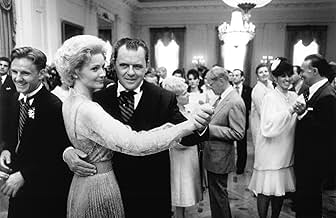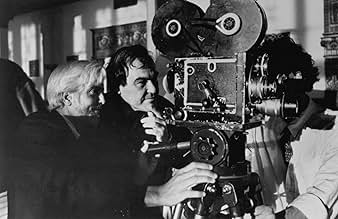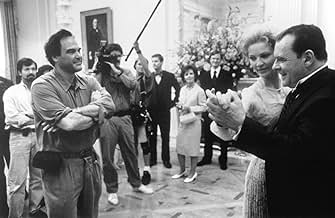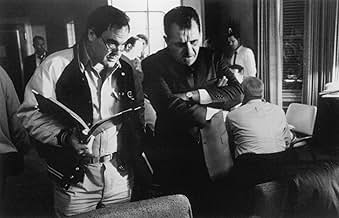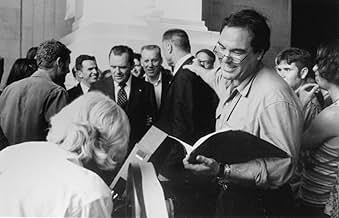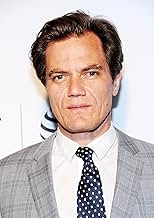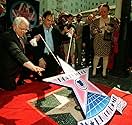CALIFICACIÓN DE IMDb
7.0/10
34 k
TU CALIFICACIÓN
Biografía del expresidente estadounidense Richard Nixon, desde sus días de niño hasta su eventual presidencia, que terminó en vergüenza.Biografía del expresidente estadounidense Richard Nixon, desde sus días de niño hasta su eventual presidencia, que terminó en vergüenza.Biografía del expresidente estadounidense Richard Nixon, desde sus días de niño hasta su eventual presidencia, que terminó en vergüenza.
- Dirección
- Guionistas
- Elenco
- Nominado a 4 premios Óscar
- 11 premios ganados y 18 nominaciones en total
- Dirección
- Guionistas
- Todo el elenco y el equipo
- Producción, taquilla y más en IMDbPro
Opiniones destacadas
Oliver Stone has a way of making films that grab you and hold you until the final frame. His films are usually controversial and that's what generates much debate and Nixon is no exception. Anthony Hopkins assumes the mantle of Richard M. Nixon and he does it with style. His Nixon is a complex man, full of ambition and dreams, but also filled with demons. Nixon lives in the shadow of JFK, and because of that, he feels he can never live up to the greatness that he aspires to. Joan Allen is equally convincing as Pat Nixon. She is a strong woman who loves her husband, but unlike Nixon, she grows tired of the political world. The film works best when we see the inner workings of the Nixon Whitehouse. We see the coverup of the Watergate break in. We see Nixon's historic visit to China and we see the final farewell of a flawed, but ambitious man. It's hard to cram an entire lifetime into a three hour film, but Stone manages to do it well. We get brief glimpses into Nixon's past and we see the events that eventually undid him. Some may say that Nixon is painted in an unfair light. I think Stone actually sympathizes with him. Here was a man who came into power in the middle of a war. He was feared by many and misunderstood by all. Nixon was able to rise above it all for a short period of time, and in that brief period, he did have the world.
10krumski
I'm not normally a fan of Oliver Stone (in fact, I've NEVER liked an Oliver Stone picture before)but this one just blew me away. The reason I usually don't like him is that, though he is a great technical director and visual stylist, his scripts are heavy-handed and one-sided to the point of absurdity. But not here. In fact, the script is perhaps the most impressive element in this whole movie, not only for how ambiguous and even-handed it is in dealing with Nixon as a character, but also for the brilliant way it moves around in time. It starts with Nixon, feeling embattled in the White House in 1973 as the Watergate hearings are upon him, and uses the device of him listening to his secret tapes to jump back and forth to previous eras, flawlessly moving between past and present to give an impressionistic, kaleidoscopic overview of the man's life, instead of following the staid and ho-hum linear approach most movie biographies take (most recent example: "Man on the Moon", the bio on Andy Kaufman which was a snoozer in spite of a great performance by Jim Carrey mainly because of the dry boring, "This happened. . .And then this happened" approach).
Another reason to see this film is the brilliant, absolutely overwhelming lead performance by Anthony Hopkins; his Nixon may not look or sound exactly like the 37th president (but come on, except maybe for Ed Sullivan, who does?) but he embodies his qualities - strengths as well as weaknesses - to such an enormous degree that he simply BECOMES Nixon, at least for the three hours the movie is on screen.
I have to say, though, I was not nearly as impressed as every one else (critics and general audiences alike) seems to be about Joan Allen as Pat Nixon. It's nothing against her performance, she did fine, it's just that as written, the part is rather weak. In fact, I was much more bothered about the liberties the filmmakers took in fleshing out her character than in all the political events; it's like, whenever they wanted to have someone blast Nixon or act as his conscience, they'd trot out Ol' Pat, giving her some of the most embarrasingly "speechified" moments in all of the movies - almost none of their scenes together ringed true as husband as wife; it was more like Nixon sitting across from the Filmmakers' Conscience. In fact, she's angry at him so often in the film you have to wonder, what exactly does she love about the man? The film never answers (or attempts to answer) this question.
But this one minor quibble is not enough to make me downgrade this film. It is an absolutely stunning achievement by any stretch of the imagination, and it contains some interesting thematic and technical echoes of both Citizen Kane (cavernous high ceiling scenes, a "March of Time"-type newsreel on Nixon, a dinner scene between Dick and Pat at a long, impersonal table) as well as The Godfather (the burnished, half-dark half-light cinematography, several "chamber of power" scenes in tight, dark and claustrophobic rooms)that I found, in context, to be totally appropriate. It paints both Nixon and the times he (and the country) lived through on a grand and mythic scale that was truly awesome and, once again, entirely appropriate. Yes, it's a film that is at times big, loud and bombastic (because so, after all, was Nixon himself) but, just as often quiet, contemplative and told at an achingly *human* level. The contrast between these two states is what gives the film a good deal of its overall power and, as I've said, I never would have believed that Stone would have been capable of doing the smaller, quieter scenes so well.
This is a good film to have on tape or DVD, for two reasons. It's so long, and so dense with facts, characters and events, that you're not likely to want to watch it all the way straight through (the first time I saw it was in the theater and though I was held spellbound, I began wishing for an intermission at about the two-hour mark, not so much to stretch my legs but to give my brain a chance to process all I'd seen and heard so far). Also, and more importantly, the videotape includes after the credits two scenes cut out of the final film for time purposes. In both cases, I believe, a severe mistake was made - these are both, I believe, ESSENTIAL sequences; not just nice to have as an additional bargain, but scenes which Stone should have fought tooth and nail to keep in (even cutting out some others if he had to - my vote would have been to excise a few of those Pat Nixon scenes instead). Once scene involves Nixon's visit to the CIA and another a discussion between Nixon and J. Edgar Hoover in the Oval Office. The first scene is a masterpiece of writing and acting (with Sam Waterston as CIA Director Richard Helms, otherwise in no other scene of the movie) and the other is, I think, key in understanding Nixon's motivation to begin taping his White House conversations in the first place (also - an issue which is touched on no other place in the movie). I feel that these two scenes should be edited back into their appropriate places in the movie; seeing them separated from the rest of the film is better than not seeing them at all, but they really belong as part of the entire story.
Another reason to see this film is the brilliant, absolutely overwhelming lead performance by Anthony Hopkins; his Nixon may not look or sound exactly like the 37th president (but come on, except maybe for Ed Sullivan, who does?) but he embodies his qualities - strengths as well as weaknesses - to such an enormous degree that he simply BECOMES Nixon, at least for the three hours the movie is on screen.
I have to say, though, I was not nearly as impressed as every one else (critics and general audiences alike) seems to be about Joan Allen as Pat Nixon. It's nothing against her performance, she did fine, it's just that as written, the part is rather weak. In fact, I was much more bothered about the liberties the filmmakers took in fleshing out her character than in all the political events; it's like, whenever they wanted to have someone blast Nixon or act as his conscience, they'd trot out Ol' Pat, giving her some of the most embarrasingly "speechified" moments in all of the movies - almost none of their scenes together ringed true as husband as wife; it was more like Nixon sitting across from the Filmmakers' Conscience. In fact, she's angry at him so often in the film you have to wonder, what exactly does she love about the man? The film never answers (or attempts to answer) this question.
But this one minor quibble is not enough to make me downgrade this film. It is an absolutely stunning achievement by any stretch of the imagination, and it contains some interesting thematic and technical echoes of both Citizen Kane (cavernous high ceiling scenes, a "March of Time"-type newsreel on Nixon, a dinner scene between Dick and Pat at a long, impersonal table) as well as The Godfather (the burnished, half-dark half-light cinematography, several "chamber of power" scenes in tight, dark and claustrophobic rooms)that I found, in context, to be totally appropriate. It paints both Nixon and the times he (and the country) lived through on a grand and mythic scale that was truly awesome and, once again, entirely appropriate. Yes, it's a film that is at times big, loud and bombastic (because so, after all, was Nixon himself) but, just as often quiet, contemplative and told at an achingly *human* level. The contrast between these two states is what gives the film a good deal of its overall power and, as I've said, I never would have believed that Stone would have been capable of doing the smaller, quieter scenes so well.
This is a good film to have on tape or DVD, for two reasons. It's so long, and so dense with facts, characters and events, that you're not likely to want to watch it all the way straight through (the first time I saw it was in the theater and though I was held spellbound, I began wishing for an intermission at about the two-hour mark, not so much to stretch my legs but to give my brain a chance to process all I'd seen and heard so far). Also, and more importantly, the videotape includes after the credits two scenes cut out of the final film for time purposes. In both cases, I believe, a severe mistake was made - these are both, I believe, ESSENTIAL sequences; not just nice to have as an additional bargain, but scenes which Stone should have fought tooth and nail to keep in (even cutting out some others if he had to - my vote would have been to excise a few of those Pat Nixon scenes instead). Once scene involves Nixon's visit to the CIA and another a discussion between Nixon and J. Edgar Hoover in the Oval Office. The first scene is a masterpiece of writing and acting (with Sam Waterston as CIA Director Richard Helms, otherwise in no other scene of the movie) and the other is, I think, key in understanding Nixon's motivation to begin taping his White House conversations in the first place (also - an issue which is touched on no other place in the movie). I feel that these two scenes should be edited back into their appropriate places in the movie; seeing them separated from the rest of the film is better than not seeing them at all, but they really belong as part of the entire story.
Watergate hardly gets a mention in this film. We see the 'plumbers' donning rubber gloves, and the president fumbling with a few of his tapes, but detail is almost totally eschewed. There is no Egil Krogh, no Jeb Magruder. Kleindienst and Gray are mentioned only in passing. Cox is fired by way of a spoken TV bulletin, Jaworski is not referred to at all. We do not see anything of the titanic courtroom struggles, with all three branches of the federal government locking horns. Though we are told that the American Constitution is self-righting, like a boat immune from capsize, we are not shown how or why.
And in this, Oliver Stone is perfectly right. As it stands, the film is very long, and dense with detail. There is no room for the minutiae of the cover-up, which in any event would make for a confusing narrative. Stone's subject is Nixon the man, not the edifice that toppled around him.
And what a man. Richard Milhous Nixon is a truly fascinating personality - both statesman and charlatan: ruthless and vulnerable: unable to express his emotions, yet the most emotional of politicians: a man who spent his life in the law and in high office, but who never absorbed the legal and ethical mores of public life. Genius and crook, bold visionary and spiteful backstabber, Nixon will continue to spellbind biographers for decades to come.
"That's when it starts," says Stone's Nixon, "when you're a kid." The film takes us to Whittier, California in 1925 to see the unloved boy who struggled painfully to earn his parents' approval, without ever quite succeeding. As a teenager, he levered his way into the school football squad by sheer willpower. Lacking talent, he doggedly subjected himself to repeated physical battering in the scrimmages, "a tackle dummy with guts". This syndrome recurs throughout his career. Always susceptible to scathing criticism, never quite commanding respect, Nixon never the less kept ploughing back into the melee when wiser, lesser men would have quit. It is hardly surprising that the years of punishment should have left psychological scars.
Nixon's hatred of John Kennedy had more than one source. He was devastated by the defeat in the 1960 presidential election, but not simply because of disappointment at losing, or even because the Kennedy victory carried the odour of fraud: bitterest of all for Nixon was the realisation that the Kennedy people had played hardball more effectively than the Republicans. Nixon had been out-sharked, and it hurt. On a more profound level still, John Kennedy was everything that Nixon could never be. He was a smooth, handsome prince among men, exuding poise and confidence, a patrician imbued with the habit of authority. To Nixon, the perpetual outsider, the quaker geek who looked shoddy and disreputable, Kennedy seemed to have the dice unfairly loaded in his favour. JFK was an East Coast bright boy and war hero, fabulously wealthy and impeccably well-connected. Nixon owned nothing and knew nobody, and was all too obviously 'on the make'. The great witch-hunts, of Hiss in the 1940's and Ellsberg in the 1970's, are manifestations of the chip on Nixon's shoulder, the fathomless bile that he directed at East Coast college boys.
Nixon always imagined that he was hiding his pain from the world, whereas in fact it was on global display. His nervous little laugh at moments of emotional crisis was so false, so gut-wrenchingly inappropriate, that the onlooker could catch a glimpse of the man's tortured soul. Hopkins captures the wretched laugh with devastating effectiveness, both in the scene where Nixon is confronted by a hostile man in the TV studio audience, and when he solemnly promises that none of the president's men will go to jail. In the "Checkers" broadcast and the presidential TV address on Watergate, Nixon tries to assure the camera that he is not a crook, and on both occasions he has the exact opposite effect, confirming to the viewer that that is precisely what he is. Nixon seems incapable of examining his own conscience: there is a hard core which his rational mind cannot penetrate. Maybe that is why Stone has him referring to himself in the third person throughout the film.
'They' were always out to get Nixon, without it ever being made clear just exactly who 'they' might be. The imperative for this deeply paranoid man was always to be braced, ready for the coming tackle, or to organise pre-emptive strikes against 'them'. Obstructing justice and tampering with evidence were, to Nixon, self-defensive steps that did not need to be justified. It was obvious that such things had to be done. The mystery at the heart of Watergate - why a president so steeped in criminal conspiracy should tape-record his own intimate conversations - makes sense when viewed from Nixon's end of the telescope. He had to have the goods on his own men, ready for the day when they turned on him. It goes even further. This emotional cripple could not bare his bleeding soul to anyone, so his tapes became his confessional and his confidante. Stone's film repeatedly shows Nixon in his awkward arms-extended, double V-sign pose. It is not by chance that it looks like a crucifixion.
And in this, Oliver Stone is perfectly right. As it stands, the film is very long, and dense with detail. There is no room for the minutiae of the cover-up, which in any event would make for a confusing narrative. Stone's subject is Nixon the man, not the edifice that toppled around him.
And what a man. Richard Milhous Nixon is a truly fascinating personality - both statesman and charlatan: ruthless and vulnerable: unable to express his emotions, yet the most emotional of politicians: a man who spent his life in the law and in high office, but who never absorbed the legal and ethical mores of public life. Genius and crook, bold visionary and spiteful backstabber, Nixon will continue to spellbind biographers for decades to come.
"That's when it starts," says Stone's Nixon, "when you're a kid." The film takes us to Whittier, California in 1925 to see the unloved boy who struggled painfully to earn his parents' approval, without ever quite succeeding. As a teenager, he levered his way into the school football squad by sheer willpower. Lacking talent, he doggedly subjected himself to repeated physical battering in the scrimmages, "a tackle dummy with guts". This syndrome recurs throughout his career. Always susceptible to scathing criticism, never quite commanding respect, Nixon never the less kept ploughing back into the melee when wiser, lesser men would have quit. It is hardly surprising that the years of punishment should have left psychological scars.
Nixon's hatred of John Kennedy had more than one source. He was devastated by the defeat in the 1960 presidential election, but not simply because of disappointment at losing, or even because the Kennedy victory carried the odour of fraud: bitterest of all for Nixon was the realisation that the Kennedy people had played hardball more effectively than the Republicans. Nixon had been out-sharked, and it hurt. On a more profound level still, John Kennedy was everything that Nixon could never be. He was a smooth, handsome prince among men, exuding poise and confidence, a patrician imbued with the habit of authority. To Nixon, the perpetual outsider, the quaker geek who looked shoddy and disreputable, Kennedy seemed to have the dice unfairly loaded in his favour. JFK was an East Coast bright boy and war hero, fabulously wealthy and impeccably well-connected. Nixon owned nothing and knew nobody, and was all too obviously 'on the make'. The great witch-hunts, of Hiss in the 1940's and Ellsberg in the 1970's, are manifestations of the chip on Nixon's shoulder, the fathomless bile that he directed at East Coast college boys.
Nixon always imagined that he was hiding his pain from the world, whereas in fact it was on global display. His nervous little laugh at moments of emotional crisis was so false, so gut-wrenchingly inappropriate, that the onlooker could catch a glimpse of the man's tortured soul. Hopkins captures the wretched laugh with devastating effectiveness, both in the scene where Nixon is confronted by a hostile man in the TV studio audience, and when he solemnly promises that none of the president's men will go to jail. In the "Checkers" broadcast and the presidential TV address on Watergate, Nixon tries to assure the camera that he is not a crook, and on both occasions he has the exact opposite effect, confirming to the viewer that that is precisely what he is. Nixon seems incapable of examining his own conscience: there is a hard core which his rational mind cannot penetrate. Maybe that is why Stone has him referring to himself in the third person throughout the film.
'They' were always out to get Nixon, without it ever being made clear just exactly who 'they' might be. The imperative for this deeply paranoid man was always to be braced, ready for the coming tackle, or to organise pre-emptive strikes against 'them'. Obstructing justice and tampering with evidence were, to Nixon, self-defensive steps that did not need to be justified. It was obvious that such things had to be done. The mystery at the heart of Watergate - why a president so steeped in criminal conspiracy should tape-record his own intimate conversations - makes sense when viewed from Nixon's end of the telescope. He had to have the goods on his own men, ready for the day when they turned on him. It goes even further. This emotional cripple could not bare his bleeding soul to anyone, so his tapes became his confessional and his confidante. Stone's film repeatedly shows Nixon in his awkward arms-extended, double V-sign pose. It is not by chance that it looks like a crucifixion.
Richard Nixon's (Oscar-nominee Anthony Hopkins) life is told from his early childhood days in 1920s California to his disgraceful resignation in 1974 from the Watergate scandal (one of the stupidest and most trivial events of U.S. history). The 37th president of the U.S. lost the 1960 presidential election to JFK and then lost the California governor race of 1962. By 1963 it appears that Nixon is out of the spotlight for good politically and that he is struggling to keep his marriage to Pat Nixon (a superb turn by Oscar-nominee Joan Allen in arguably her finest role) alive. Things turn strange though as Nixon has strange meetings with big-time oil men in Texas (Larry Hagman leading the group) and even with J. Edgar Hoover (scene-stealer Bob Hoskins). It is obvious that there are some potentially sinister things going on from high-ranking people. Soon JFK is assassinated, the 1964 election becomes a mess for both parties as LBJ wins by default and then LBJ decides not to run in 1968. The Republicans once again turn to Nixon, but Nixon (full of self-doubt and inferiority complexes) is fearful that 1968 against RFK will be a repeat of 1960 (Nixon believes that JFK and the Democrats stole the 1960 presidency). More cloak and dagger situations occur and RFK is assassinated in California, leaving the door open for Nixon to win the presidency. Vietnam, a whole host of questionable allies (led by James Woods, E.G. Marshall, J.T. Walsh, David Paymer, David Hyde Pierce, Powers Boothe, Fyvush Finkel) and constant advisement from Henry Kissinger (an amazing transformation by Paul Sorvino, who rivals Hopkins' performance the whole way) end up turning Nixon's life upside down. Soon taped White House conversations and growing paranoia also pops up and public/national/international/military/social chaos ensues. While all this occurs the president's personal life is shown through flashbacks (Mary Steenburgen as his mother and Tony Goldwyn as his older brother dominate these parts of the film). We see two of his brothers dying of tuberculosis, his short courtship of his wife and various other parts of his early life that stand out. The Watergate break-in (led by Ed Harris) continues to be one of the strangest things that has ever happened (the motives of the apparent burglary have never been clear). 18 minutes of missing audio recordings are one of the biggest mysteries of the 20th Century. Director Oliver Stone (who received an Oscar nod for co-writing the script) surprisingly is unbiased with this film. Watching "Platoon", "Born on the Fourth of July" and "JFK" would lead one to believe that Stone would pull no punches with "Nixon". However he gives Nixon's story an element of truth and compassion. There are so many unknown things that went on with Nixon throughout his political career that Stone has to fill in lots of missing pieces with speculations (some that seem very logical and some not so much). Thus the film goes on and on (running about 195 minutes). Even with all the airtime though the film does not move slowly and never becomes dull. In fact it is one of those projects that could have gone on even longer and it still would have been an interest-generator. Whether you like, dislike or are indifferent when it comes to Nixon the person, "Nixon" the movie is an outstanding achievement that stands high with Stone's better works and also deceptively becomes one of the more under-rated and under-appreciated pictures of the 1990s. 5 stars out of 5.
Richard Nixon is one of the most controversial heads of state of the twentieth century. During his tenure as president of the United States, he earned a general hatred almost as high as the power and influence of his office. He was investigated, vilified, attacked but never condemned. Even though I'm not an American nor an expert of these period, I feel it is necessary to make an unbiased and objective historical analysis of this president, I just don't know if that has already happened. Even so, the film we have here didn't seem partial, trying to remain neutral to some extent.
Directed by Oliver Stone, it's not appropriate for people who don't know anything about Nixon, or Watergate, or this period of American history, since the film wasn't wasting time explaining anything. So if you didn't understand why Nixon opened the US to China or what was the Watergate or the Bay of Pigs, I suggest you ignore the movie for now and first go read some books or see some documentaries about it. Another problem I want to highlight is the huge web of conspiracies and obscure theories that the film weaves around the president. It never lets us understand what "crimes of responsibility" Nixon has committed. The film also suggests, without subtleties, that Nixon was a simple man who rose in life but wasn't accepted by the "American aristocracy" because of this humble origin, which left him deeply hurt. I don't know if it's true, but the film indicates that as origin of President's lack of scruples.
Anthony Hopkins assures the main role in an interesting performance, but that's far from being his best. He made a good preparation and tried his best to be Nixon, but has few physical similarities with him, not to mention his extreme difficulty in imitating president's characteristic voice. Anyway, Hopkins was brilliant at his character's psychological work, with most dramatic scenes going on as he, semi-drunk, reviews his decisions while listening to his famous audio tapes. The remaining cast does a reasonable supporting work. I will not close my review without left a word of appreciation to the sets and costumes, which rebuilt the atmosphere and culture of the Seventies quite well, much like the rooms and offices within White House. Not being exceptional, it's an elegant, quality film, that helps us think about an important period in American history.
Directed by Oliver Stone, it's not appropriate for people who don't know anything about Nixon, or Watergate, or this period of American history, since the film wasn't wasting time explaining anything. So if you didn't understand why Nixon opened the US to China or what was the Watergate or the Bay of Pigs, I suggest you ignore the movie for now and first go read some books or see some documentaries about it. Another problem I want to highlight is the huge web of conspiracies and obscure theories that the film weaves around the president. It never lets us understand what "crimes of responsibility" Nixon has committed. The film also suggests, without subtleties, that Nixon was a simple man who rose in life but wasn't accepted by the "American aristocracy" because of this humble origin, which left him deeply hurt. I don't know if it's true, but the film indicates that as origin of President's lack of scruples.
Anthony Hopkins assures the main role in an interesting performance, but that's far from being his best. He made a good preparation and tried his best to be Nixon, but has few physical similarities with him, not to mention his extreme difficulty in imitating president's characteristic voice. Anyway, Hopkins was brilliant at his character's psychological work, with most dramatic scenes going on as he, semi-drunk, reviews his decisions while listening to his famous audio tapes. The remaining cast does a reasonable supporting work. I will not close my review without left a word of appreciation to the sets and costumes, which rebuilt the atmosphere and culture of the Seventies quite well, much like the rooms and offices within White House. Not being exceptional, it's an elegant, quality film, that helps us think about an important period in American history.
¿Sabías que…?
- TriviaTo gain the feel of Richard Nixon, Sir Anthony Hopkins watched on tape almost every speech Nixon ever made several times. He also met some people who knew Nixon who could lend Hopkins some insight on him.
- ErroresThe film shows Nixon signing his resignation letter the day before he leaves office and prior to it being publicly announced. Historically, Nixon informed the nation in an address the night before leaving office, and then signed the letter the next day, which was his last morning in the White House.
- Citas
Richard M. Nixon: [to a portrait of Kennedy] When they look at you, they see what they want to be. When they look at me, they see what they are.
- Créditos curiososSecond opening credits: "For what is a man profited, if he shall gain the whole world, and lose his own soul?" Matthew 16:26.
- Versiones alternativasLetterbox video version features additional outtake footage, including a scene starring Sam Waterston as CIA director Richard Helms.
- Bandas sonorasMenuetto
from Schubert's "Symphony No. 2 in B Flat Major, D 125"
Written by Franz Schubert
Performed by Koninklijk Concertgebouworkest (as Royal Concertgebouw Orchestra)
Nikolaus Harnoncourt, Conductor
Courtesy of Teldec Classics International GmbH
By arrangement with Warner Special Products
Selecciones populares
Inicia sesión para calificar y agrega a la lista de videos para obtener recomendaciones personalizadas
- How long is Nixon?Con tecnología de Alexa
Detalles
Taquilla
- Presupuesto
- USD 44,000,000 (estimado)
- Total en EE. UU. y Canadá
- USD 13,681,765
- Fin de semana de estreno en EE. UU. y Canadá
- USD 2,206,506
- 25 dic 1995
- Total a nivel mundial
- USD 13,681,765
- Tiempo de ejecución3 horas 12 minutos
- Color
- Mezcla de sonido
- Relación de aspecto
- 2.39 : 1
Contribuir a esta página
Sugiere una edición o agrega el contenido que falta



